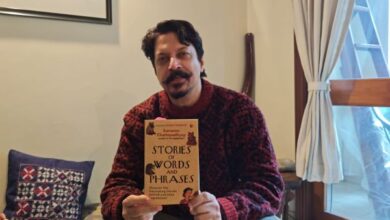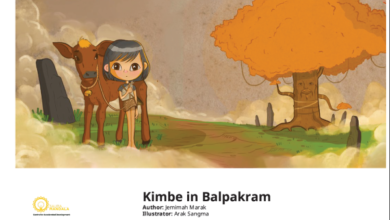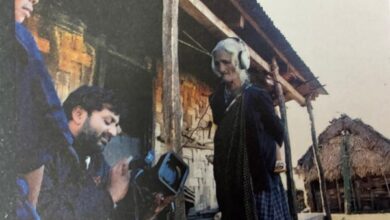BOOK REVIEW: The maddening Market & the escape route
Novel by Gyan Chaturvedi, a Padma Shri awardee, puts a critical lens on post-liberalisation society and economy at various levels

 “The individual has always had to struggle to keep from being overwhelmed by the tribe,” German philosopher Friedrich Nietzsche wrote about individuality and conformity. Here, a tribe can be anything — society, customs, social media (in the context of the 21st century), an authoritarian government’s propagandising or the herd of Gadarene Swine in a consumerist world.
“The individual has always had to struggle to keep from being overwhelmed by the tribe,” German philosopher Friedrich Nietzsche wrote about individuality and conformity. Here, a tribe can be anything — society, customs, social media (in the context of the 21st century), an authoritarian government’s propagandising or the herd of Gadarene Swine in a consumerist world.
Nietzsche’s observation on the struggle to maintain individuality can be seen in the allegorical novel, The Madhouse, which has been translated from Gyan Chaturvedi’s Hindi novel Pagalkhana by Punarvasu Joshi. Published by Niyogi Books, the novel puts a critical lens on post-liberalisation society and economy at various levels.
The story has two main characters — the Market or Bazaar, who can be seen as the antagonist, and the Citizen, the struggling protagonist who, despite his weakness, is desperate to find a way out of the quagmire that is consumerism.
The Citizen is a faceless entity (sometimes addressed by a mere surname), and his story is a palimpsest of psychological struggles manifested in various forms of insanity. Sometimes he resists the tricks his memory plays on him; sometimes his blank eyes search for lost dreams; and sometimes he is the “crazy man” who is determined to find light at the end of the dark tunnel.
 Chaturvedi’s description of the madness that infects the Citizen is humorous and horrifying at the same time. When a father fears that his son might sell him as an old junk on the internet, it is not just a figment of his wild imagination but a deep impact of the disintegrating social values and the growing disenchantment with the changing world around. It is not just the physical Bazaar that has commodified our thoughts, but also its virtual sibling that is taking over human civilisation.
Chaturvedi’s description of the madness that infects the Citizen is humorous and horrifying at the same time. When a father fears that his son might sell him as an old junk on the internet, it is not just a figment of his wild imagination but a deep impact of the disintegrating social values and the growing disenchantment with the changing world around. It is not just the physical Bazaar that has commodified our thoughts, but also its virtual sibling that is taking over human civilisation.
When a man wants to take refuge in the manhole to escape the filth of society, his sentiment cannot be seen in isolation, for he might find several like-minded ‘Citizen’ whose lives have been engulfed by the so-called promises of a better life. The Underworld seems to be a better option when the daily squalor threatens one’s individuality.
When conformity is the way that the Market preaches and advertises, one man finds the courage to call out the sham. He also finds a way to defy the herd mentality. So, he digs a tunnel that will take him to a new world. He refuses to share details of his clandestine ‘tunnel project’. If I were to talk to myself out loud in a language not understood by those present, my thoughts would be hidden from them. (Ludwig Wittgenstein) But for how long? And when he speaks the language that everyone understands, he becomes a “crazy man”.
However, the tunnel does take him to a new world, which shares an umbilical relation with the old. The man ends up in a temple, reincarnated as Tunnel Baba, who can solve any problem despite being silent. Hail the godmen of the country who create a parallel universe to show the ‘right way’ to the lost souls!
Read reviews of other translated novels:
- A sense of pride in Krishnagopal Mallick’s writings
- In search of the being within
- Living in fear of rebels & State high-handedness
How can one blame a man who remembers every number attached to his name but his name? The unique numbers, and not the self, are our identities in this world that is trying to build a method in the madness. Or is it?
As I continued reading the novel, I remembered a book in Bengali, titled Nagarmanthan, which I read over a decade ago. A translated work, the novella expressed similar cynicism about the world, both real and virtual. The Madhouse, which was first released in 2018, seemed to be a build-up on the thought process.
The Market is shrewd. He does not want the Citizen to remember individuality and allows consumerism to gnaw at one’s mind and soul, gradually transforming the entity into his blind disciple. Sometimes one’s conscience may flicker to life, but he dare not question the ways of the Bazaar.
Don’t question, even if you are losing your dreams. Don’t look too deeply into the problem and move on. “Dreams aren’t for sale, Mister!” did you say? Think again, think hard. Your life can be bereft of dreams, and your eyes may follow the path that the Market actively advertises. The more you chase your dreams, the more you end up amid broken dreams that hurt and make you cry blood.
Chaturvedi’s novel is more about introspection than criticism. His anonymous characters show us the dark side of society that we try to ignore, the class and caste divides that refuse to vanish, the pseudo-reality of social media that shadows our critical thinking and the Market’s commodification of everything and everyone. It becomes difficult to escape the claustrophobic existence. But the cycle has to be completed to remain optimistic. The despair that Chaturvedi creates throughout the novel finally ends in the hope of an imminent revolution.
Book: The Madhouse; Author: Gyan Chaturvedi, translated by Punarvasu Joshi; Publisher: Niyogi Books; Pages: 458; Price: Rs 595
Banner image by Alan Cabello: https://www.pexels.com/photo/hand-among-orange-leaves-1492364/





